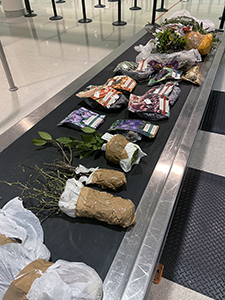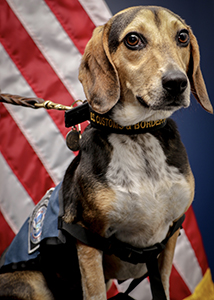BALTIMORE – It may be more of a vest than a cape on their backs, but the great Gatsby proves once again that U.S. Customs and Border Protection’s Beagle Brigade are superheroes.
While conducting roving inspections, CBP agriculture detector dog Gatsby alerted to the baggage of a family of three that arrived on a flight to Baltimore Washington International Thurgood Marshall Airport from Iceland on January 7. CBP agriculture specialists inspected the baggage and discovered a total of 21 prohibited propagative plants and bags of bulbs in the family’s baggage. The family declared possessing only tulip bulbs.
Passengers are required to attain phytosanitary certificates from the original country verifying that the plants meet United States entry requirements. Propagative plant materials may be invasive to our nation’s ecology and pose a potential threat to crop plants. Soil-borne pests or pathogens threaten both plants and animals. Learn more about bringing agricultural products to the United States.
CBP agriculture specialists examined the plants and discovered a worm and two snails and submitted the specimens to the U.S. Department of Agriculture for identification.
The plants and bulbs were seized for destruction.
CBP released the family, who traveled from the United Kingdom and were destined to their residence in Frederick County, Va., after they paid a $300 civil penalty for possessing undeclared prohibited agricultural items.
Gatsby is part of CBP’s Beagle Brigade, highly qualified canine partners that help CBP agriculture specialists protect our nation’s vital agricultural resources from plant and animal diseases, invasive insects, and federal noxious weed. Gatsby has served on CBP’s Beagle Brigade for nearly five years.
“Finding such a vast quantity of plants and bulbs in one family’s baggage is unusual and the potential threat these items pose to our nation’s agricultural resources underscores the importance of travelers knowing what they can and cannot bring to the United States,” said Adam Rottman, Area Port Director for CBP’s Area Port of Baltimore. “This is another in a long series of important finds by Gatsby and Customs and Border Protection’s Beagle Brigade.”
CBP agriculture specialists have extensive training and experience in the biological sciences and agricultural inspection, and they inspect tens of thousands of international air passengers, and air and sea cargoes being imported to the United States. They are on our nation’s frontlines to ensure our nation’s economic resilience by protecting our critical agricultural resources.
During a typical day last year, CBP agriculture specialists across the nation seized 4,552 prohibited plant, meat, animal byproducts, and soil, and intercepted 319 insect pests at U.S. ports of entry.
CBP urges all travelers to visit CBP’s Travel website to ‘know before they go’ and learn what products that are prohibited or inadmissible to bring to the United States.
CBP's border security mission is led at our nation’s Ports of Entry by CBP officers and agriculture specialists from the Office of Field Operations. CBP screens international travelers and cargo and searches for illicit narcotics, unreported currency, weapons, counterfeit consumer goods, prohibited agriculture, invasive weeds and pests, and other illicit products that could potentially harm the American public, U.S. businesses, and our nation’s safety and economic vitality.
Learn what CBP accomplished during "A Typical Day" in 2021 and learn more about CBP at www.CBP.gov.
Follow the Director of CBP’s Baltimore Field Office on Twitter at @DFOBaltimore for breaking news, current events, human interest stories and photos, and CBP’s Office of Field Operations on Instagram at @cbpfieldops.



